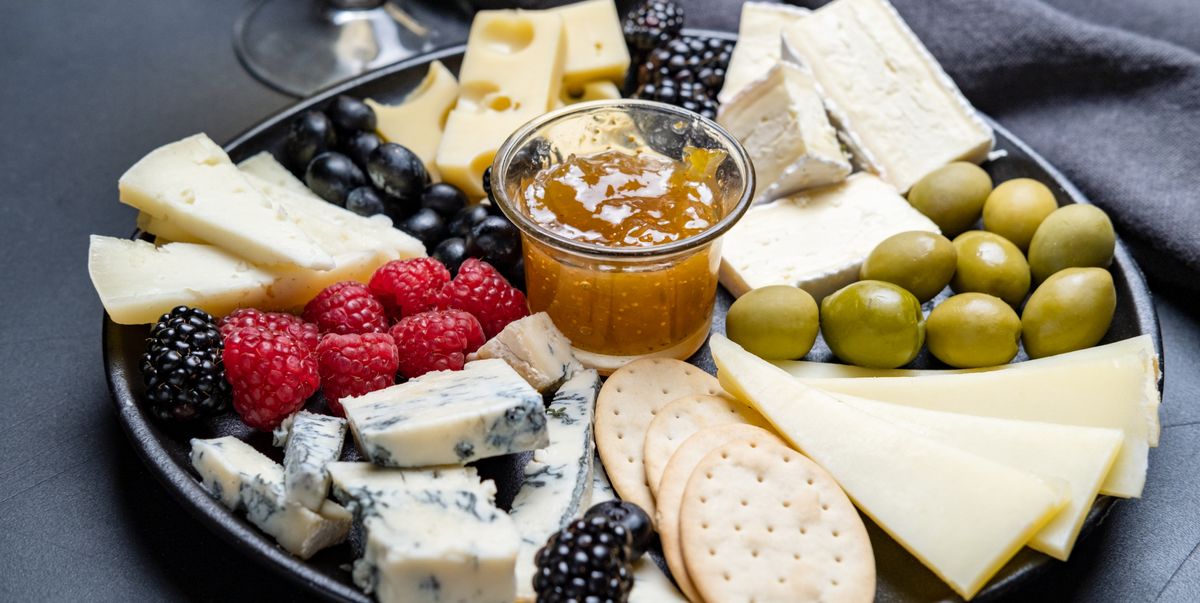Do you think cheese should always be considered a guilty pleasure? Think again. While some types of cheese are loaded with fat and sodium and don’t have much nutritional value, others offer enough protein, vitamins, and healthful bacteria to be considered downright healthy.
In our quest to determine the healthiest cheeses, we consulted two dietitians and a food scientist. As we learned, there were a lot of different factors to consider. Rosemary Trout, program director of culinary arts and food science at Drexel University, advised us to “look at nutrient density per calorie as one factor,” as well as “satiety…and how well nutrients are absorbed and metabolized.” Jennifer Altman, PsyD, RD, recommended that we look at cheeses that are “low in saturated fat and sodium, and high in protein, calcium, and probiotics.”
With all that in mind, here are five healthy cheeses that we should feel great about eating more often:
More From Delish

Mozzarella
Packing a whopping six grams of protein per one-ounce serving, mozzarella is one of the healthiest cheeses we can be eating. According to Altman, mozzarella is “lower in saturated fat and sodium, both nutrients to limit” as well as “a good source of calcium, phosphorus, and zinc, all essential nutrients for good bone health.” It’s also a good source of the bacterias Lactobacillus casei and Lactobacillus fermentum: two valuable probiotics that promote good gut health. Bring on the mozzarella sticks and the stuffed-crust pizza.
Goat Cheese
This soft, creamy cheese comes with a host of health benefits, mostly due to the fact that it’s made from—you guessed it—goat’s milk. Goat’s milk is high in Vitamin A and riboflavin (Vitamin B2), and it also contains less lactose than cow’s milk, which is good news for those of us who are lactose intolerant.
Additionally, according to Trout, “goat milk…has a higher concentration of short chain fatty acids compared to bovine milk.” These fatty acids may result in that “intense, pungent…flavor associated with goat milk cheese,” but they are also more “metabolically reactive,” meaning that they’re less likely to be stored as excess fat on the body. Also, according to Kim Yawitz, RD and owner of Two Six Fitness in St. Louis, Mo, these smaller fat molecules are “digested more quickly . . . which can help you feel fuller faster” leading to “eating fewer calories at later meals.” A cheese that comes with built-in portion control assistance? Yes, please.
Cottage Cheese
High in protein and loaded with valuable Vitamins B and B12, this creamy cheese has been a well-known health food for years. According to Yawitz, “one cup…contains 24 grams of muscle-building, belly-filling protein,” making it a “go-to recommendation” for people who “struggle to get enough protein.”
Yawitz shares that many cottage cheese brands also “contain bacteria that can help bolster your immune system and improve digestion.” Maybe it’s time to give that viral cottage cheese cookie dough a shot! Or, if you’re not feeling the sweet, try out this spicy cottage cheese pasta.
Parmesan
Boasting a whopping 10 grams of protein per ounce, true parmesan cheese is also very low in lactose, so it’s easier to digest than most cow’s milk cheeses. It’s also high in calcium, with 335 mg per ounce serving. Parmesan is fairly high in sodium, so it’s not advised to eat in large amounts—especially if that’s a concern for you—but fortunately it packs such a punch of flavor that most of us aren’t consuming huge chunks of it in one sitting anyway.
Swiss Cheese
This famously holey cheese was originally shortlisted as a superfood 2017, when Korean researchers discovered that it contains a valuable probiotic called propionibactirium freudenriechii. According to Yawitz, studies have suggested that this probiotic can “help decrease inflammation, fight off infection, and even slow the aging process.” Beyond the benefits of this probiotic, Yawitz shares that swiss cheese is also high in other key nutrients, including “vitamin b12, calcium, and phosphorus.” It’s also “a good source or protein and calcium, which are good for bone health,” Altman said. When was the last time you had a Reuben sandwich? Might want to get back on that.
Which cheese is the healthiest? It depends on what’s most important to you. If you’re looking for more protein in your diet, raid your local grocery store for cottage cheese and parmesan. If you’re concerned with the amount of sodium in your diet, grab a ball of mozzarella. And if you want to feel stronger, healthier, and possibly even live longer, reach for that block of Swiss.
Assistant Food Editor
Taylor Ann Spencer is the assistant food editor at Delish, where she develops recipes, creates recipe videos, and styles food. With a background in writing and theater as well as professional cooking, she enjoys sharing her love for global flavors and all things baking through informational posts, hosted videos, and just plain everyday conversations. When she’s not cooking, she’s brainstorming her next culinary mash-up. Mac ‘n’ cheese chili rellenos, anyone?
Source link
credite






